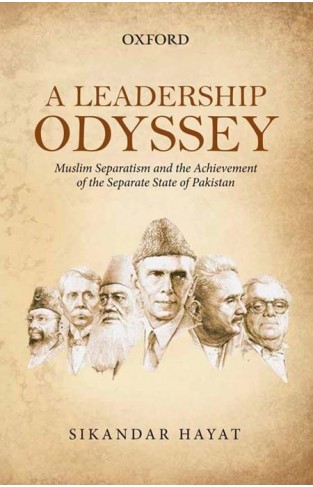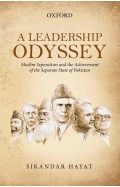- Home
- Non Fiction
- A Leadership Odyssey: Muslim Separatism And The Achievement Of The Separate State Of Pakistan
A Leadership Odyssey: Muslim Separatism And The Achievement Of The Separate State Of Pakistan
By: Sikandar Hayat
-
Rs 870.00
- Rs 1,450.00
- 40%
You save Rs 580.00.
Due to constant currency fluctuation, prices are subject to change with or without notice.
This book offers a unique historiography of the phenomenon of Muslim separatism as it affected and shaped modern South Asia. It describes the journeys of six prominent Muslim leaders of British India: Syed Ahmad Khan, who laid the foundation of the Muslim separatist political movement; Sultan Muhammad Aga Khan III, Syed Ameer Ali, and Maulana Mohamed Ali, who strengthened and developed it in their own ways; Allama Muhammad Iqbal, who took its cause further and formulated the idea of a separate state; and, of course, Quaid-i-Azam Mohammad Ali Jinnah, who, after making the demand for a separate state, transformed it into the nationalist Pakistan Movement and led it successfully to achieve the separate state of Pakistan. Previous studies have not explained Muslim separatism in such a leadership framework. In this book, based on an ‘instrumentalist’ approach, Muslim separatism has been analysed through the contributions of a host of Muslim leaders, one after the other, helping and reinforcing each other, and thus leading all the way to the achievement of Pakistan.
This book offers a unique historiography of the phenomenon of Muslim separatism as it affected and shaped modern South Asia. It describes the journeys of six prominent Muslim leaders of British India: Syed Ahmad Khan, who laid the foundation of the Muslim separatist political movement; Sultan Muhammad Aga Khan III, Syed Ameer Ali, and Maulana Mohamed Ali, who strengthened and developed it in their own ways; Allama Muhammad Iqbal, who took its cause further and formulated the idea of a separate state; and, of course, Quaid-i-Azam Mohammad Ali Jinnah, who, after making the demand for a separate state, transformed it into the nationalist Pakistan Movement and led it successfully to achieve the separate state of Pakistan. Previous studies have not explained Muslim separatism in such a leadership framework. In this book, based on an ‘instrumentalist’ approach, Muslim separatism has been analysed through the contributions of a host of Muslim leaders, one after the other, helping and reinforcing each other, and thus leading all the way to the achievement of Pakistan.
A Leadership Odyssey: Muslim Separatism And The Achievement Of The Separate State Of Pakistan
By: Sikandar Hayat
Rs 870.00 Rs 1,450.00 Ex Tax :Rs 870.00
Zubin Mehta: A Musical Journey (An Authorized Biography)
By: VOID - Bakhtiar K. Dadabhoy
Rs 472.50 Rs 1,050.00 Ex Tax :Rs 472.50
Leave the World Behind: 'The book of an era' Independent (Bloomsbury Publishing)
By: Rumaan Alam
Rs 2,155.50 Rs 2,395.00 Ex Tax :Rs 2,155.50
The Origins of Political Order From Prehuman Times to the French RevolutioN
By: Francis Fukuyama
Rs 3,505.50 Rs 3,895.00 Ex Tax :Rs 3,505.50
Manning Up: How the Rise of Women Has Turned Men into Boys
By: Kay Hymowitz
Rs 646.75 Rs 995.00 Ex Tax :Rs 646.75
The Obama Syndrome: Surrender At Home War Abroad
By: Tariq Ali
Rs 1,165.50 Rs 1,295.00 Ex Tax :Rs 1,165.50
The Quest For Meaning: Developing A Philosophy Of Pluralism
By: Tariq Ramadan
Rs 1,255.50 Rs 1,395.00 Ex Tax :Rs 1,255.50
The Pakistan US Conundrum Jihadists The Military And The People The Struggle For Control
By: Yunas Samad
Rs 1,255.50 Rs 1,395.00 Ex Tax :Rs 1,255.50
An Enemy We Created: The Myth Of The Taliban Al Qaeda Merger In Afghanistan 19702010
By: Alex Strick van Linschoten
Rs 3,412.50 Rs 5,250.00 Ex Tax :Rs 3,412.50
WikiLeaks: Inside Julian Assanges War on Secrecy
By: David Leigh & Luke Harding
Rs 552.50 Rs 850.00 Ex Tax :Rs 552.50
Leave the World Behind: 'The book of an era' Independent (Bloomsbury Publishing)
By: Rumaan Alam
Rs 2,155.50 Rs 2,395.00 Ex Tax :Rs 2,155.50
No recently viewed books available at the moment.
Zubin Mehta: A Musical Journey (An Authorized Biography)
By: VOID - Bakhtiar K. Dadabhoy
Rs 472.50 Rs 1,050.00 Ex Tax :Rs 472.50
A Leadership Odyssey: Muslim Separatism And The Achievement Of The Separate State Of Pakistan
By: Sikandar Hayat
Rs 870.00 Rs 1,450.00 Ex Tax :Rs 870.00
Leave the World Behind: 'The book of an era' Independent (Bloomsbury Publishing)
By: Rumaan Alam
Rs 2,155.50 Rs 2,395.00 Ex Tax :Rs 2,155.50















-120x187.jpg?q6)







-120x187.jpg?q6)



-120x187.jpg?q6)



